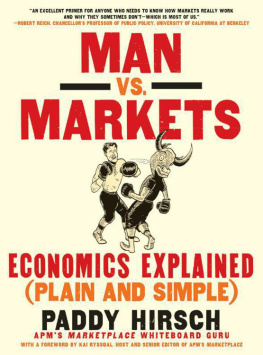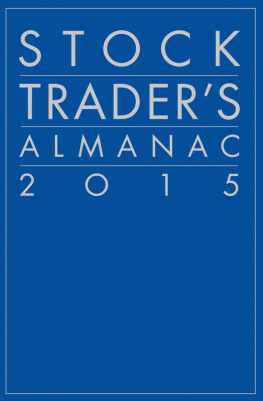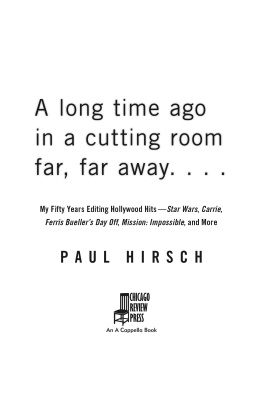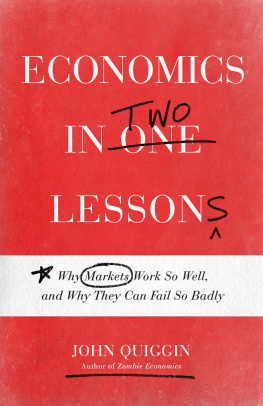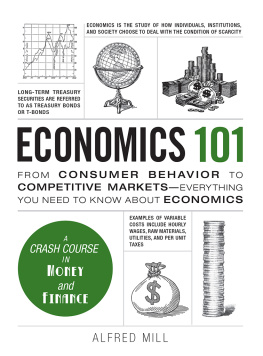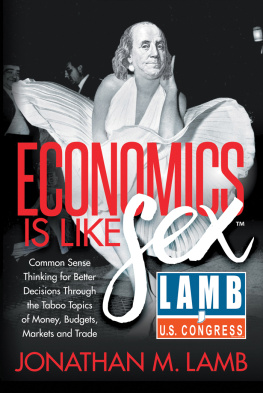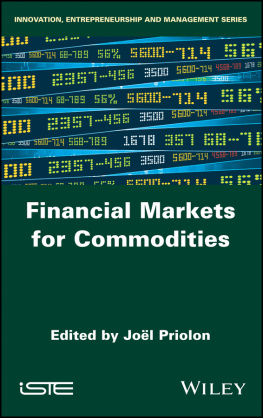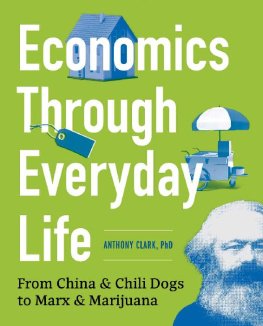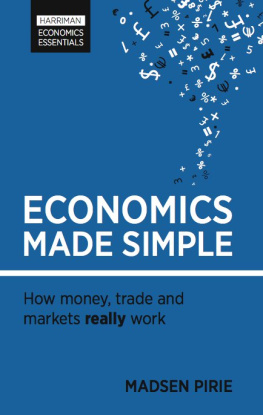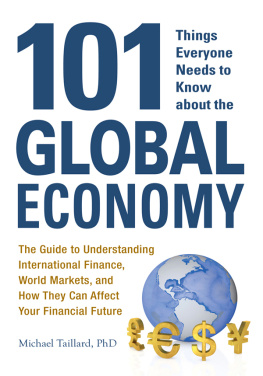MAN
VS.
MARKETS

ECONOMICS EXPLAINED
(PLAIN AND SIMPLE)
PADDY HIRSCH
With Illustrations by Dan Archer

CONTENTS
M y thanks to everyone who made this book possible, particulary my wonderful agent, Laurie Fox at the Linda Chester Literary Agency, and my editor, Colleen Lawrie at HarperCollins. Thanks to Nancy Lilienthal, Darlene Chan, and Frank DePalma for introducing me to Laurie, and to Brandan Newman and Doug Krizner for their ideas, feedback, and support thoroughout the production process.
I owe a special debt to all the staff at Marketplace for their fellowship and friendship, and for their assistance with the creation of the Whiteboard, which showed me the need for this book. Dalasie Michaelis and Richard Core were instrumental in the Whiteboards genesisthey had the idea of putting the first video on the Web, and Dalasie, Angela Kim, and Daryl Paranada have done a wonderful job of making me look good on camera over the years. Thanks also to JJ Yore for giving me the green light to take the Knight Fellowship, which gave me the time and mental bandwidth to produce the book.
Thank you to Kalika Nacion Yap for her invaluable help with my Web site and social media strategy, and to Monica Holloway and Michael Price for their unqualified and enthusiastic support and encouragement. Thanks also to Jim Bettinger, Dawn Garcia, Pam Maples, and all the staff and fellows of the 2011 Knight Fellowship. The year I spent with them at Stanford helped me see the world, and myself, in a different light, and gave me the resources that I needed to produce this booknot least by introducing me to the excellent comics journalist Dan Archer, whose illustrations adorn these pages.
Finally, and most importantly, thank you Eileen, for your love and consistent advice, and for putting the steel in my spine when I needed it most.
W hats that, you say? You dont need to understand the markets cause youre not in the markets? Oh. All right, then. Never mind about your 401(k). Or your teenagers college fund. Or the Treasury bond your Uncle Fred bought for the same teenager when she was born. You dont have a bank account? Or an insurance policy? Or a credit card? Or well, I could continue but I think you see where Im going.
While Im at it, lets take care of one big misconception right up front. There is no such thing as the market (singular). When business journalists say, Today the market reacted to blah blah blah , its actually quite the disservice. As the book youre about to read explains, the markets (plural) is a many-headed, often impenetrable, and frequently infuriating beast. Markets dont always work right. Sometimes they work all too well. Every now and then they simply stop working. ( see also : Crash, financial, U.S., circa 20078.) But they matter. And were stuck with them.
People often say the markets (plural) are basically gambling. That the odds are stacked against the average investor and he doesnt stand a chance. Thats not entirely true. Yes, as youll read, there are parts of the financial system where the house always wins. Sometimes it does always feel like everyones betting against you. And, sure, professional speculators can always dislocate an otherwise rational trade. But day in and day out its the money from those average investorswhether through retirement funds or home mortgages or any one of dozens of other tradesthat makes the markets work.
One last thingthe title of this book is no accident. Investing is Man vs. Markets in the truest sense of the word. The markets (plural) arent for the faint of heart. Theyre not for dabblers or casual passersby. They demand a certain degree of attentionnever mind that youre not even in the markets (or so you think). You might not give a fig about the Dow Industrials or care what an option is, but believe me when I tell you what you dont know can hurt youand what you learn in this book can help you immensely, no matter which path you take.
Kai Ryssdal


A friend of minelets call him Tamcame to America from Southeast Asia as a young boy in the 1970s. He likes to tell the story of his familys first visit to the supermarket. He remembers walking into the store and encountering a dizzying array of produce in every color of the rainbow. He and his family were transfixed. They stood, staring at the rows and rows of fruits, vegetables, cans, and packages. They needed to buy groceries, but they were so bewildered by the endless variety of products in the store that they left without buying a thing.

The next day, Tams mother went to the store with a neighbor, who showed her where to find the things the family was familiar with, and some new products that they would find useful. She taught them how to navigate the place, and how to find what they needed, pointing out familiar goods and suggesting alternatives to what they had used in their homeland. Pretty soon Mom, Dad, and all the kids knew the store as well as they knew their own home. And it wasnt long before they were complaining that the store, for all its variety, lacked products that had been staples in their country of origin.
Thank heaven for that friendly neighbor, who showed my friends family there was nothing intimidating about the grocery store. In other words, she demystified that market.
Man vs. Markets aims to be just like that neighbora guide that will show you that the financial markets arent as daunting as they might appear at first glance. In fact, when you look closely, a lot of what goes on in the markets is surprisingly familiar: most of what happens on Wall Street is actually a more involved version of what happens every day in billions of households all over the world.

When most people hear the word market , they immediately think about the stock market . Thats because stocks, or shares in publicly traded companies, are the most high-profile investments in the financial world. Theyre a bit like apples at the grocery store: piled high in the center of the store and available all year round.
There are two interrelated reasons why shares are so prominent in the public consciousness. First, a huge number of Americans own them, either directly or through their retirement accounts. Perhaps as much as 50 percent of the U.S. population owns shares, according to studies by the Investment Company Institute. Second, because so many of us own stock, the media pays a great deal of attention to how those shares perform. Thats why theres so much news coverage of movements in the Dow Jones Industrial Average or the S&P 500 here in the United States, the FTSE 100 in the United Kingdom, and the Nikkei 225 in Japan.

But just as there is a great deal more for sale in the grocery store than that pile of apples, theres a lot more available in the financial markets than just shares. Bonds, futures, swaps, money market funds, collateralized debt obligations, currencies: in the financial markets, exotic products are piled high by bankers who are constantly looking for new things to sell to investors.
Next page
